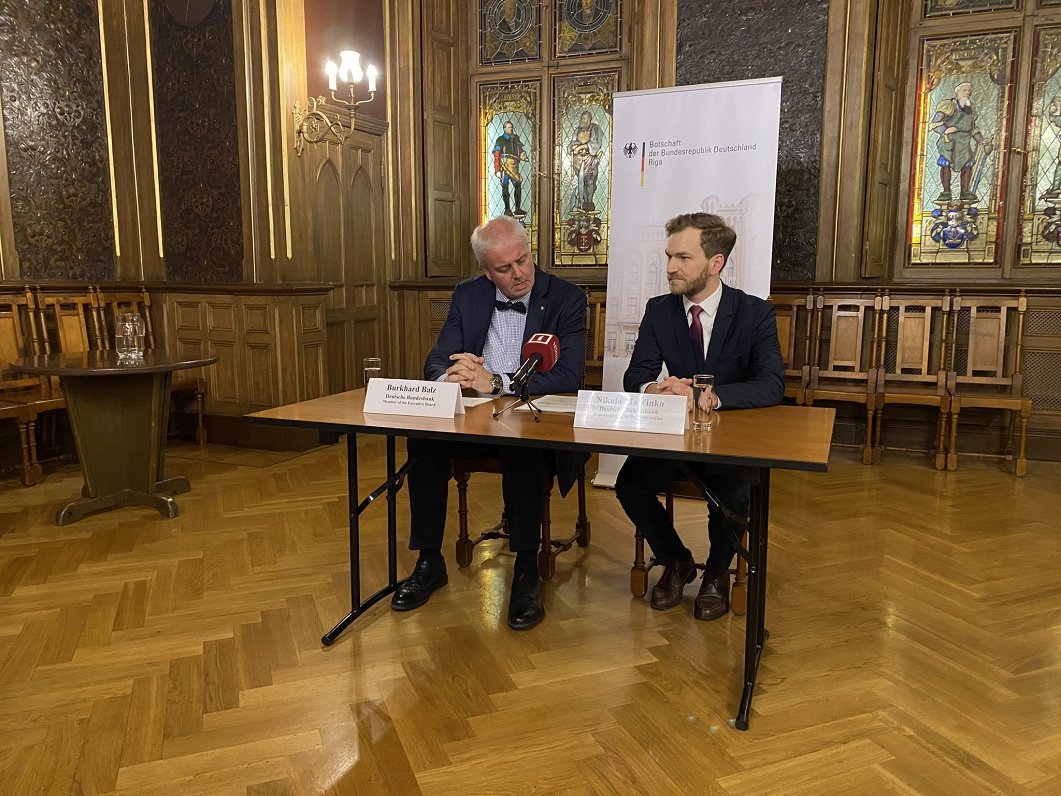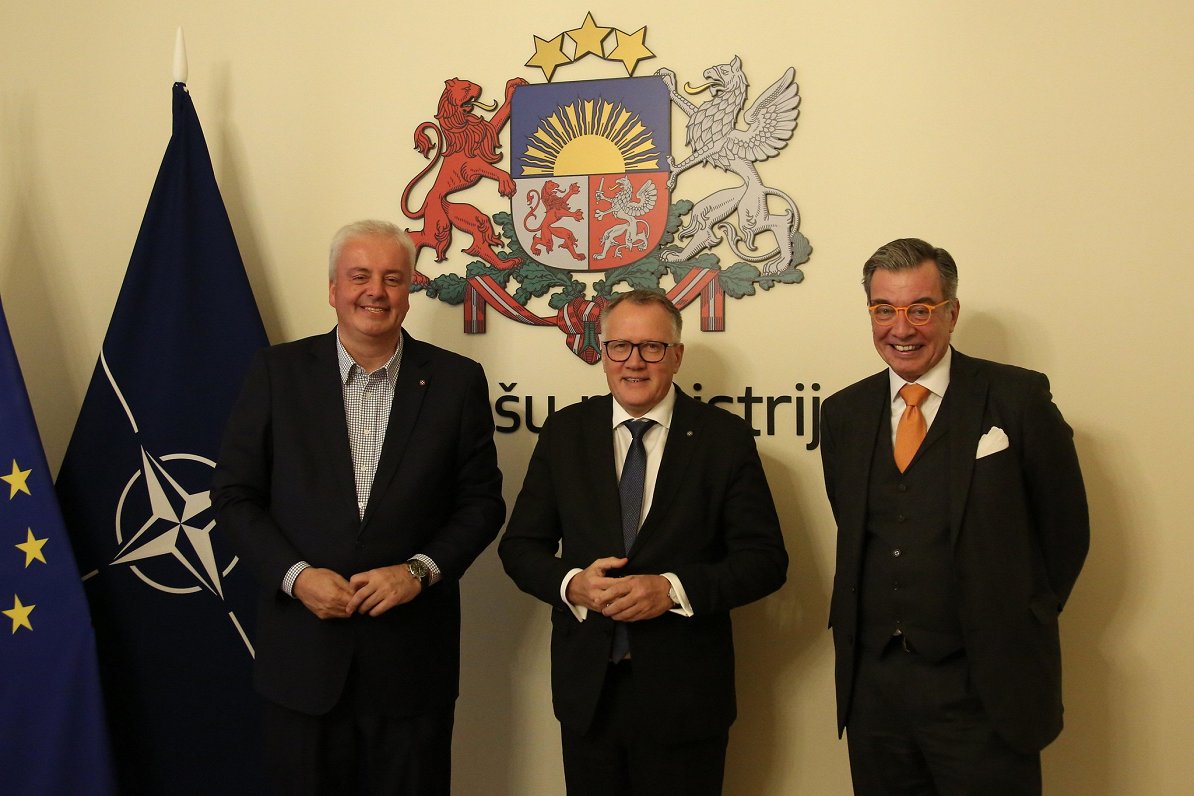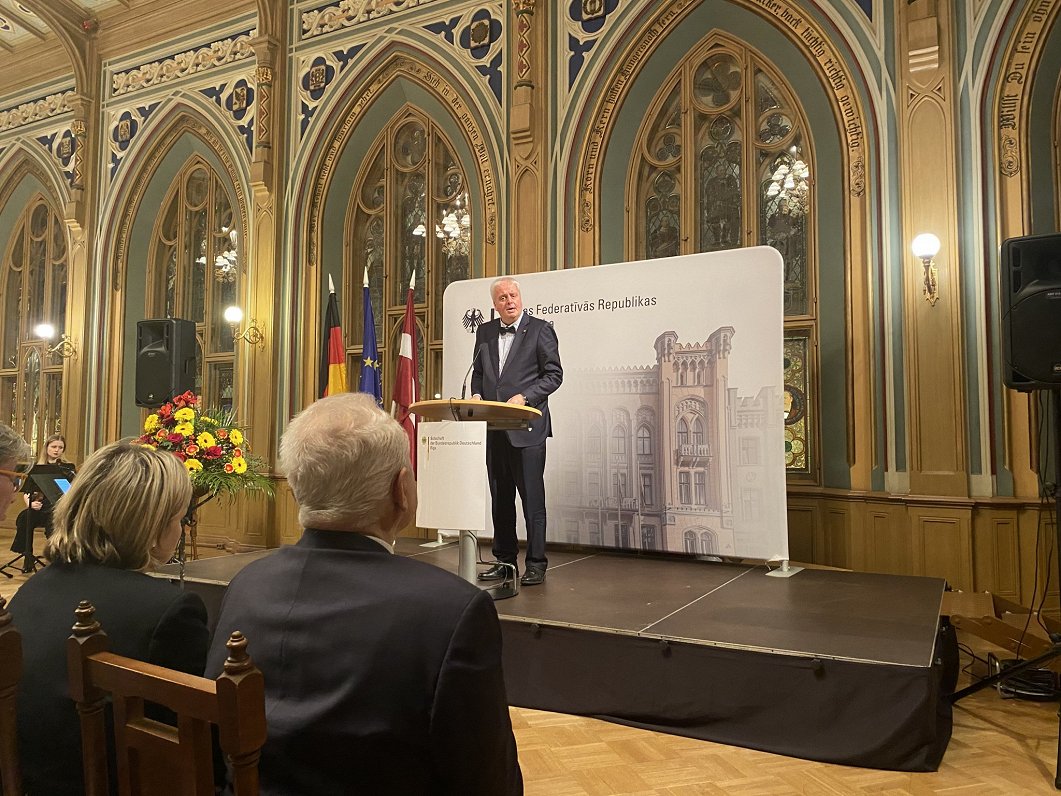“We do see really big benefits in close cooperation“, Bundesbank board member Burkhard Balz told the press ahead of the official inauguration ceremony on January 31 in Riga. “We are really convinced that direct personal contacts between the central banks foster dialogue and strengthen also a mutual understanding, which is from my point of view of utmost importance in our common endeavour to safeguard price stability.“
Representing the Bundesbank is now Nikola Marcinko, who will be posted as financial attaché at the German embassy in Riga for an initial three years starting from February 2024. “He will report on developments in Latvia, Estonia and Lithuania concerning economic and fiscal policy and financial stability“, Balz outlined Marcinko´s task, adding that “he will also foster the Bundesbank’s trust-based relationships with the central banks of the Baltic states and will strengthen its contacts with national authorities and financial institutions on the ground.”

The new Bundesbanker in town was welcomed at the event in the Small Guild by Latvian central bank governor Mārtiņš Kazāks who stressed the long and “very special relationship” of Latvijas Banka with Germany's central bank. “We are happy to have you here, and we hope that our cooperation will be very, very fruitful”, he greeted Marcinko in his speech, as did also the Deputy Governors of the central banks of Estonia and Lithuania, Ülo Kaasik and Asta Kuniyoshi.
Marcinko himself was pleased with the high level welcome he received in Riga. “I'm absolutely thrilled“, he told LSM at the sidelines of the inauguration ceremony, adding that he has had a personal interest in the job after various positions at Bundesbank and a stint at the German Ministry of Finance. “There is a close bond between the Bundesbank and the central banks here. Often, not everywhere, but often we agree and are having the same opinion. And this is simply a great basis for making further contacts. “
Close collaboration past and present
Speaking in front numerous professionals from the finance and banking sector, parliamentarians and members of the diplomatic corps, Kazāks recalled the Bundesbank`s pivotal role in creating and shaping Latvia´s main monetary authority.
“Latvia, when it regained independence in 1990, initially built the Bank of Latvia on the blueprint of Bundesbank. Especially on the notion of central bank independence that is very close to our hearts“, he said.
The Bundesbank for decades was considered a national icon in Germany that underscored its independence in clashes with various chancellors and finance ministers over monetary policy. Following a stern and profound stability culture, it stood as guarantor for a strong currency and was an institution that citizens of Europe`s biggest economy trusted more than any other. "Not all Germans believe in God, but they all believe in the Bundesbank," European Commission president Jacques Delors famously quipped back in 1992.

Things changed later with the introduction of the euro as the common European currency in January 1999. Monetary policy has since then been decided by the European Central Bank (ECB) where the Bundesbank is now just one voice among many but still is considered to have an important role to play in deciding the course of the Europe’s main bank. Fulfilling its role as guardian of the euro, the ECB is currently struggling to contain rampant inflation and achieve its ultimate aim: maintaining price stability in the euro area.
"What is now important is to closely monitor economic and financial developments in the euro area and draw the right conclusions. The exchange of expertise between central banks is an important basis for this“, Balz said in his speech in Riga, adding that this is also why the Bundesbank has taken the step of seconding a representative to the Baltics.
"Regular dialogue increases mutual understanding and allows us to move closer to our common objective of safeguarding price stability,” he said.
Estonia, Latvia and Lithuania are often seen as like-minded allies for Germany and its conservative and hawkish approach in fiscal and monetary policy. All of them have pursued sound and prudent policies since restoring its independence in 1991 that centred on the formal adoption of balanced budget and low public debt. This enabled them to join the euro that is now the common currency across the Baltics. Lithuania was the last of three countries to adopt the euro in 2015, after Estonia did so in 2011 and Latvia followed suit in January 2014.
Economically and politically important move
Calling it an “exciting and inspiring new perspective of German-Baltic relations“, German ambassador Christian Heldt commended the decision taken by the Bundesbank. “With this new post the Baltic states will be in a very exclusive club of German embassies around the world hosting the representative from the Bundesbank. It is also a clear signal in these challenging times for Europe, the euro system, that we seek to foster economic and institutional cooperation between our countries“, the hosting envoy said.
The new representative in Riga is part of Bundesbank’s global network of 16 representative offices and representatives posted at German embassies and general consulates in major financial centres.
"There are such cities like Rome, São Paulo, Mumbai, Madrid – and now the Baltics. That is fantastic”, Latvian Finance Minister Arvils Ašeradens said in his welcoming remarks, calling the posting of a Bundesbank representative in Riga an “important move to make the Baltic economies more understandable in Germany”.
Highlighting the current geopolitical circumstances and Russia’s war against Ukraine, Ašeradens went on to say that he considers the step of the Bundesbank to be a “great act of solidarity” and signal of unity and togetherness. In a similar way, also the three representatives of the Baltic central banks underlined in their remarks the importance of enhanced cooperation for strengthening the economic partnership and building up more resilience to tackle joint challenges.

“The circumstances in which we meet today, of course, are quite special and can be characterized by one short German word. And the German word is Zeitenwende“, Kazāks pointed out, referring to a famous expression which translates as "turning point" or "watershed". It was memorably used by German Chancellor Olaf Scholz after the Russian attack on Ukraine and brought about a paradigm shift in German foreign and security policy.
“Zeitenwende should also resolve in us the building of a new business model that decouples from Russia fundamentally. And this model will further enhance our sovereignty and prosperity”, the Latvian central bank chief said, mentioning that:
"Already before Russia's full-scale war in Ukraine, we in Latvia have learned the hard way that servicing financial flows to and from Russia is poisonous and, more broadly, that the business model of a bridge between the east and the west is an illusion.“
Bundesbank but no German bank
The arrival of the Bundesbank and its representative added to big hopes that other players of Germany’s financial service and banking sector might expand to the Baltics and start operating in the region. The wish and expectation that commercial banks and credit institutions from the main trading partner of Estonia, Latvia and Lithuania will enter the market were clearly raised both in some of the welcoming remarks and private conversations at the inauguration ceremony.
German banks have previously been active in the Baltics but none of them is currently present in the Estonian, Latvian or Lithuanian markets anymore – to the displeasure of many entrepreneurs and policy makers.
“We are working on that, and we will hopefully see some developments in this area as well,” Florian Schröder, CEO the German-Baltic Chamber of Commerce in Estonia, Latvia, Lithuania (AHK), told LSM, adding that there is “an increasing interest of German investors in the Baltics.”
Asked whether this includes commercial banks, Schröder answered: “If there is enhancing investments and commitment in the real economy, you also need it to be backed on the financial side. It is a mirror, and so I would expect to see some news in this area as well, ” the AHK chief executive suggested, while being
full of praise for the Bundesbank`s engagement in the region. “I think it is an important signal of stability and deepening cooperation and commitment to the Baltic States.”






























